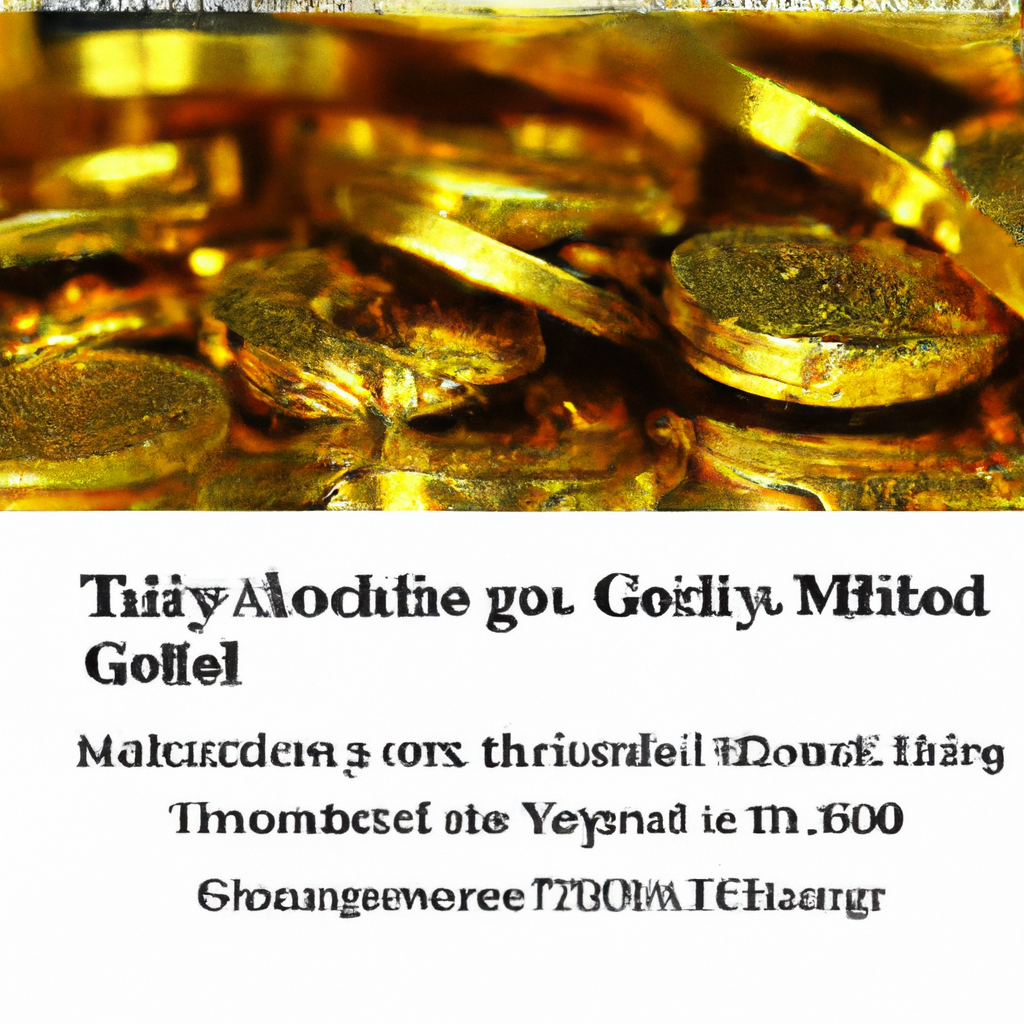Curious about the tax implications of investing in gold in Malaysia? Well, you’re not alone. As a fund manager and gold investment expert, you probably want to make sure you’re fully informed about any potential taxes that might impact your investment. In this article, we’ll take a closer look at whether or not there are any tax implications for gold investments in Malaysia. So, get ready to dive into the world of Malaysian tax laws and regulations, and discover how they might affect your gold investment strategy.

Taxation System in Malaysia
Malaysia has a well-established taxation system that encompasses various aspects of financial transactions, including investments in gold. Understanding the tax implications of gold investments is essential for investors to make informed decisions and ensure compliance with the law. In this article, we will explore the different types of gold investments, the reasons why individuals choose to invest in gold, as well as the potential risks and rewards associated with such investments.
Understanding Gold Investments
Gold has long been considered a safe haven investment, offering stability and a hedge against inflation. There are various types of gold investments available to individuals, ranging from physical gold such as gold bars and coins, to gold exchange-traded funds (ETFs), gold mining stocks, and gold futures contracts. Each type of investment carries its own set of advantages and considerations, and it is crucial to understand these factors before diving into the world of gold investments.
Types of Gold Investments
- Physical Gold: This involves the purchase and ownership of physical gold in the form of bars or coins. Investors can choose to hold the gold themselves or store it in secure vaults.
- Gold ETFs: Gold exchange-traded funds are investment funds that track the price of gold and allow investors to gain exposure to the precious metal without owning physical gold.
- Gold Mining Stocks: Investing in gold mining companies is another way to indirectly invest in gold. These stocks are influenced by factors such as company performance, management, and the price of gold.
- Gold Futures Contracts: Gold futures allow investors to speculate on the future price of gold. These contracts are subject to expiration dates and require careful consideration of market trends.
Why Invest in Gold
There are several reasons why individuals choose to invest in gold:
- Store of Value: Gold has historically maintained its value over time, making it an attractive investment option for those seeking to preserve their wealth.
- Hedge Against Inflation: Gold is often considered a hedge against inflation, as its value tends to rise when inflation is high.
- Portfolio Diversification: Adding gold to an investment portfolio can help diversify risk, as the precious metal often performs differently from other asset classes.
- Safe Haven Investment: During times of economic uncertainty or geopolitical tension, investors often turn to gold as a safe haven investment.
- Potential for Capital Appreciation: The price of gold can fluctuate, offering potential opportunities for capital appreciation.
Risks and Rewards of Gold Investments
While gold investments offer various potential benefits, it is important to consider the risks involved:
- Volatility: The price of gold can be subject to significant fluctuations, which can lead to potential losses or gains.
- Market Timing: Timing the market correctly can be challenging, and investors may be exposed to the risk of buying at a high price or selling at a low price.
- Storage and Security: Physical gold investments require proper storage and security measures to protect against theft or damage.
- Economic Factors: Economic conditions, such as interest rates and global trade, can impact the price of gold and the performance of gold-related investments.
- Opportunity Cost: Investing in gold means allocating capital away from other potential investment opportunities, and it is important to consider the opportunity cost of holding gold.
Tax Implications of Gold Investments
Gold investments in Malaysia are subject to various taxes that investors need to be aware of. The taxation system considers different types of gold investments and applies specific rules and regulations to ensure fair and consistent tax treatment.
Capital Gains Tax
Capital gains tax applies to the profit made from the sale of capital assets, including gold. In Malaysia, the tax rate for capital gains depends on the holding period of the asset. Short-term capital gains, i.e., gains from the sale of assets held for less than one year, are taxed at the individual’s marginal tax rate. Long-term capital gains, i.e., gains from the sale of assets held for more than one year, are subject to a lower tax rate.
Real Property Gains Tax
Real Property Gains Tax (RPGT) may be applicable to certain gold investments, particularly those classified as “real property” under Malaysian law. RPGT is imposed on the gains derived from the disposal of real property, including shares in real property companies. However, the application of RPGT to gold investments is subject to specific conditions and exemptions.
Goods and Services Tax (GST)
As of June 1, 2018, the Goods and Services Tax (GST) in Malaysia has been replaced by the Sales and Service Tax (SST). However, it is important to note the implications of the previous GST system on gold investments. Under the GST regime, gold investments were subject to a 6% tax, with certain exemptions and criteria for gold bars and coins.
Inheritance Tax
Currently, Malaysia does not impose inheritance tax on wealth passed down from one generation to another. However, it is essential to keep track of potential changes in tax legislation and plan accordingly to mitigate any future tax implications for gold investments.
Capital Gains Tax
Definition
Capital gains tax refers to the tax levied on the profit earned from the sale of capital assets, such as gold. It is calculated based on the difference between the purchase price and the selling price of the asset.
Applicable Rates
In Malaysia, the capital gains tax rate depends on the holding period of the asset. Gains from the sale of assets held for less than one year are considered short-term capital gains and are subject to the individual’s marginal tax rate. Long-term capital gains, i.e., gains from the sale of assets held for more than one year, are subject to a lower tax rate.
Exemptions and Reliefs
Certain exemptions and reliefs may apply to capital gains tax on gold investments in Malaysia. For example, individuals may be eligible for an exemption for gains derived from the disposal of personal assets used for personal purposes.
Reporting and Payment
Taxpayers are required to report the capital gains from the sale of gold investments in their annual tax returns. The gains should be included in the income section of the return, and the applicable tax should be calculated and paid accordingly.
Real Property Gains Tax
Applicability to Gold Investments
Real Property Gains Tax (RPGT) may be applicable to gold investments that meet the criteria of being considered “real property” under Malaysian law. Gold investments that qualify as real property are subject to RPGT upon disposal.
Calculation of Tax
The RPGT is calculated based on the gains derived from the disposal of real property, including shares in real property companies. The tax rate depends on the holding period of the asset, with longer holding periods generally attracting lower tax rates.
Exemptions
Certain exemptions and reliefs may apply to RPGT on gold investments. For example, there are exemptions for individuals disposing of one residential property once in a lifetime and for disposals of low-cost houses.
Reporting and Payment
Taxpayers are required to report and pay RPGT within a specified timeframe after the disposal of the real property, including qualifying gold investments. Failure to comply with the reporting and payment requirements may result in penalties and fines.
Goods and Services Tax (GST)
GST on Gold Investments
Under the previous Goods and Services Tax (GST) regime in Malaysia, gold investments were subject to a 6% tax. This meant that individuals purchasing gold would have to pay an additional 6% on top of the purchase price.
Gold Exemption Criteria
However, certain exemptions and criteria existed for gold bars and coins under the GST system. For example, gold bars with a minimum purity of 99.5% and gold coins issued by the Central Bank of Malaysia were exempt from the 6% tax.
Implications for Retail Investors
The GST on gold investments had implications for retail investors, as it increased the overall cost of purchasing gold. Retail investors had to factor in the 6% tax when making investment decisions and consider the impact on their potential returns.
Reporting and Payment
Under the current Sales and Service Tax (SST) system in Malaysia, gold investments are no longer subject to the 6% GST. However, it is essential to stay updated on any changes in the tax regulations to ensure compliance with reporting and payment requirements.
Inheritance Tax
Current Status of Inheritance Tax
Currently, Malaysia does not impose inheritance tax on the transfer of wealth from one generation to another. This means that individuals do not have to pay tax on the assets they inherit.
Potential Implications for Gold Investments
While there is no inheritance tax at present, it is important to consider the potential implications for gold investments in the future. Changes in tax legislation could lead to the introduction of inheritance tax, which may affect the transfer and taxation of gold assets.
Planning and Mitigating Inheritance Tax
To mitigate potential inheritance tax implications for gold investments, individuals should engage in proactive tax planning. This may involve structuring assets in a tax-efficient manner, having a comprehensive estate plan, and considering gifting strategies to maximize benefits for future generations.
Tax-efficient Gold Investment Strategies
To minimize tax implications and maximize the benefits of gold investments in Malaysia, individuals can consider the following strategies:
Investing through a Trust or Holding Company
By investing in gold through a trust or holding company, individuals can potentially benefit from tax advantages and asset protection. These entities can help reduce tax liabilities by utilizing appropriate tax structures and planning.
Utilizing Tax-advantaged Accounts
Utilizing tax-advantaged accounts, such as Individual Retirement Accounts (IRAs) or Private Retirement Schemes (PRS), can provide tax benefits for gold investments. Contributions to these accounts are often tax-deductible, and capital gains within the accounts may be tax-free or tax-deferred.
Considerations for Expatriates and Non-Residents
Expatriates and non-residents should be aware of their tax obligations and any applicable tax treaties between their home countries and Malaysia. Understanding the tax implications and seeking professional advice can help optimize gold investments and ensure compliance with cross-border tax laws.
Seeking Professional Advice
Navigating the tax implications of gold investments in Malaysia can be complex, especially considering the specific rules and regulations surrounding different types of investments. It is crucial to seek professional advice from tax consultants or advisors who specialize in gold investments and taxation to ensure compliance and maximize the benefits of your gold investments.
In Summary…
Investing in gold can be an attractive option for individuals looking to diversify their portfolios and protect their wealth. However, it is essential to understand the tax implications associated with gold investments in Malaysia to make informed decisions and maintain compliance with the law. By considering aspects such as capital gains tax, real property gains tax, GST, and potential inheritance tax, individuals can optimize their gold investments and plan for a secure financial future. Seeking professional advice is highly recommended to navigate the complexities of the taxation system and ensure the best outcomes for your gold investment journey.









